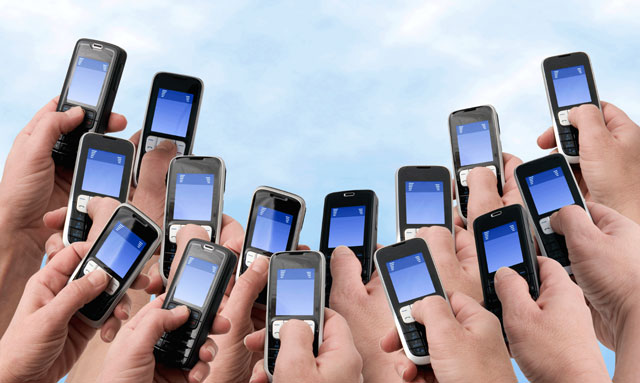
Mobile phones have become such an important part of our daily lives that they’ve started adopting our microorganisms, according to research published recently in PeerJ. James Meadow and colleagues from University of Oregon used DNA sequencing to compare bacteria living on the skin of smartphone users with those living on their phones.
“We found that, yes, we each have more bacteria in common with our own phones than with anyone else’s,” Dr Meadow said. “This opens up the possibility that we might be able to use this biological connection to understand more about the microbes that are carried around on our bodies and on our personal effects.”
We each have an estimated one trillion bacteria living on our skin. Collectively these are called the skin microbiome, the rich community of microorganisms to which our body surface plays host.
Most of these organisms are harmless or even beneficial to humans: they help defend against dangerous bacteria by competing for nutrients, producing anti-microbials, or stimulating our immune systems.
But Dr Meadow and colleagues were interested not only in our friendly resident microbes, but also in the transient microorganisms we encounter daily.
“We were exploring what we call the personal microbiome ‒ the microbes that we carry around on our personal effects,” Dr Meadow said.
“That includes stuff that comes from our human microbiome, but it also includes microbes that we pick up during the course of our day that might be hanging out on our personal effects.”
To determine exactly how much we share with our phones, Dr Meadow and colleagues took bacterial swabs from the thumbs and forefingers of 17 smartphone users, as well as from their phones.
They identified bacteria by sequencing more than 3m 16S rRNA genes contained within the samples. These genes are found in all bacteria, and their variations were used to give a breakdown of the bacteria types present in each sample.
The results at first seem very intuitive: mobile phone users shared more bacteria types with their own phones than with other people’s phones.
But Catherine Burke, a microbiologist at University of Technology Sydney, was surprised that we should share such a high proportion of our skin microbiome – 82% of the most common bacteria – with the inanimate environment of our phones.
“Even if you look at different areas of the skin you’ll see different types of microbes,” she said.
“So I was a little bit surprised that you would see so much similarity between what’s on your skin and what’s on your phone… It highlights this idea that we are transferring microbes all the time between ourselves and what we’re touching.”
Cheryl Power from the University of Melbourne’s department of microbiology and immunology found this result interesting but not necessarily unexpected.
“Apart from the stomach, skin is probably the most challenging place for microbes to survive as it is dry, acidic and suffers from constant shedding of layers of skin cells, especially if hands are constantly washed,” she said.
“So the phone surface with thin layers of skin oils and other dirt and grime probably doesn’t present much of a survival challenge.”
The study’s findings suggest we can learn a great deal about a person’s skin microbiome simply by testing their personal effects. This information could in turn have useful diagnostic implications.
“We know basically what you expect to see on healthy skin,” Dr Burke said. “Certainly, if you’ve got a skin condition like dermatitis or psoriasis, you’ll get different types of bacteria on the skin then.
“Skin can be used often as an indicator of other aspects of health, so potentially you could know something about somebody’s health if you knew what bacteria were living on their skin.
“But I don’t think we’re at the stage quite yet where we can really make that connection.”
Dr Meadow and his colleagues nevertheless consider their research a necessary first step in developing a non-invasive form of health and pathogen screening.
“[It] takes lots of levels of oversight to sample a person’s skin, for very good ethical reasons, but most people might not mind having their phone swabbed quite as much,” Dr Meadow said.
“I can imagine a time in the foreseeable future where a nurse or doctor, at the end of their day, can put their phone down on a real-time sequencing machine that is trained to look for hospital-borne pathogens.
“If I was a nurse or doctor, I might be much more likely to submit to having my phone checked every day rather than my skin, which might seem overly invasive to some people.” ![]()
- This article was originally published on The Conversation. Andrew Katsis is its editor

